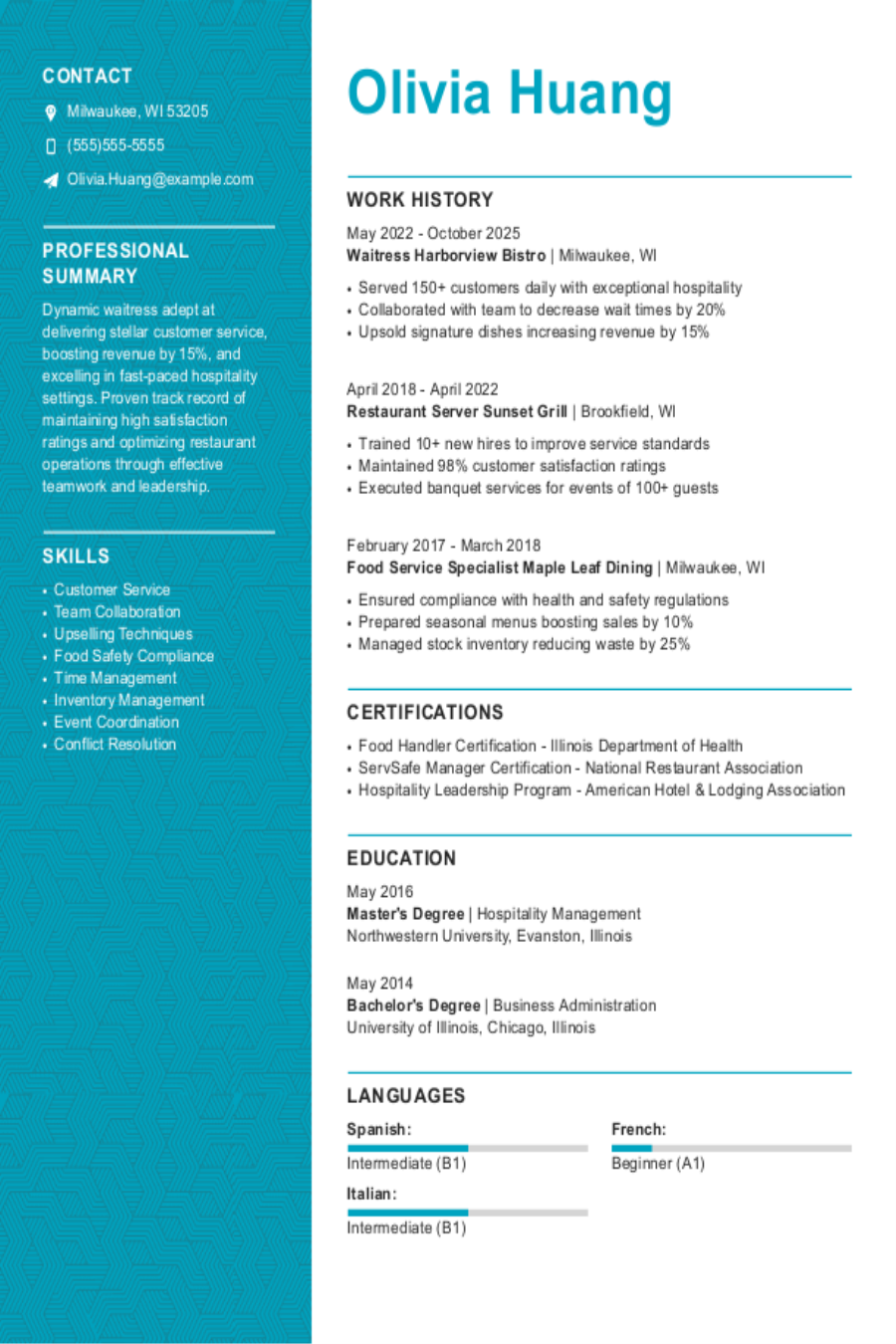Popular Nursing Resume Examples
Entry-level nursing resume
An entry-level resume for nursing should focus on clinical experiences, relevant coursework, certifications like CPR, and essential skills such as patient care and teamwork to highlight readiness for the role.
Focuses on goals: The resume reflects a dedicated nursing professional eager to improve patient care through hands-on experience and leadership roles, demonstrating a commitment to continuous improvement and professional development in the healthcare field.
Places skills over experience: The functional resume format is strategic for early career nurses, as it highlights essential skills like patient care and critical thinking over limited work history, showcasing qualifications that align with nursing roles.
Mid-career nursing resume
A mid-career nursing resume should emphasize comprehensive clinical experience, advanced skills in patient care, and ongoing professional development to demonstrate growth and leadership potential.
Balances skills and experience: This job seeker's resume showcases a strong mix of clinical expertise and career advancement, reflecting their growth from a clinical assistant to a registered nurse while improving patient care outcomes.
Includes mix of skills: This resume showcases a strong mix of hard skills, such as critical thinking and medication administration, along with soft skills like team leadership and interpersonal communication, illustrating the job seeker's well-rounded nursing expertise.
Experienced nursing resume
An experienced nursing resume should prioritize highlighting clinical skills, relevant certifications, and significant patient care achievements to effectively demonstrate professional growth and expertise in the field.
Optimized for ATS: The resume employs a clean and professional template featuring a sophisticated header combined with an ATS-friendly resume layout, improving visibility and readability for both recruiters and automated systems.
Embraces modern design: This modern resume template effectively showcases the job seeker's dedication to nursing excellence and innovative patient care approaches, reinforcing their professional identity as a proactive and compelling healthcare provider.
No experience nursing resume
A resume for an applicant with no experience seeking a nursing position should highlight relevant coursework, clinical rotations, and transferable skills to demonstrate the applicant's readiness for the healthcare environment.
Overcomes lacking experience: Including volunteer work and extracurricular activities highlights valuable skills and commitment, improving a resume by demonstrating dedication to service and teamwork, even with limited professional experience.
Emphasizes professional skills: Emphasizing relevant skills showcases the applicant's commitment to nursing and readiness to excel in a professional role, despite limited direct experience in healthcare settings.
More resume examples
Additional Guides
- Licensed Practical Nurse
- Medical Surgery Nurse
- Neonatal Intensive Care Nurse
- New Grad Nurse
- Nurse Manager
- Nurse Midwife
- Nurse Practitioner
- Nurse Supervisor
- Occupational Health Nurse
- Oncology Nurse
- Operating Room Nurse
- Pediatric Nurse
- Perioperative Nurse
- Post Anesthesia Nurse
- Progressive Care Nurse
- Registered Nurse
- RN Unit Manager
- School Nurse
- Student
- Travel Nurse
- Utilization Review Manager
Nursing Resume Template
Begin crafting your nursing career journey with this customizable resume template. Simply personalize it with your details to showcase your skills and experience effectively.
Emma Miller
Cedar Valley, MN 55140
(555)555-5555
Emma.Miller@example.com
Professional Summary
Experienced registered nurse with 9 years in patient care, proven success in enhancing care processes, and skilled in efficient team coordination driving healthcare excellence.
Work History
Registered Nurse
Harmony Health Center - Cedar Valley, MN
August 2022 - November 2025
- Managed care for 40+ patients daily
- Improved patient intake by 20%
- Coordinated team nursing tasks
Senior Caregiver
Serenity Care Solutions - Cedar Valley, MN
August 2018 - July 2022
- Assisted in daily living tasks for clients
- Implemented safety protocols, reducing falls
- Developed personalized care plans
Healthcare Assistant
Meadowbrook Clinic - Cedar Valley, MN
August 2016 - July 2018
- Supported nursing staff in patient care
- Administered medications accurately
- Enhanced clinic operations efficiency
Skills
- Patient Care
- Team Coordination
- Safety Protocols
- Healthcare Management
- Medication Administration
- Care Plan Development
- Nursing Operations
- Efficient Communication
Certifications
- Certified Nursing Assistant - American Red Cross
- First Aid & CPR - American Heart Association
Education
Master of Science in Nursing Nursing
University of Illinois Urbana, Illinois
December 2015
Bachelor of Science in Nursing Nursing
Illinois State University Normal, Illinois
December 2012
Languages
- Spanish - Beginner (A1)
- French - Intermediate (B1)
- German - Beginner (A1)
Writing Your Nursing Resume
Having explored these effective nursing resume examples, you are now prepared to dive into the intricacies of how to write a resume. We will guide you through each section methodically, ensuring you understand every important detail along the way.
List your most relevant skills
An effective skills section on your nursing resume should focus on both clinical competencies and essential soft skills like empathy and teamwork. Highlighting specific keywords from the job listing will help demonstrate your alignment with the role, making it easier for recruiters to see how you meet their needs.
This approach will not only resonate with human readers but also optimize your resume for applicant tracking systems, increasing the chances of passing initial screenings and landing an interview.
Example of skills on a nursing resume
- Compassionate caregiver with extensive experience in patient assessment and monitoring
- Proficient in administering medications and treatments according to established protocols
- Strong communicator with excellent interpersonal skills to build rapport with patients and families
- Adaptable team player who thrives in fast-paced, high-pressure environments
A strong skills section is important for demonstrating your readiness for a nursing role. It should incorporate both the technical skills specified in the job description and essential soft skills, showcasing your ability to meet the demands of the position. This balanced approach assures employers that you are well-prepared to excel in their healthcare environment.
Highlight your work history
Your work experience section is your opportunity to highlight achievements that exemplify your nursing skills and the care you provided to patients. Using strong action verbs and relevant keywords will capture the attention of hiring managers.
For each job entry, include essential details such as your title, the name of the healthcare facility, and the dates you worked there. This information establishes your professional history and credibility as a nurse. Emphasize specific accomplishments that demonstrate your expertise in patient care, teamwork, or any specialty areas.
Example of a nursing work experience entry
- Registered Nurse
City Hospital - New York, NY
June 2019 - Present - Administer patient care to a diverse population, managing up to 10 patients per shift while ensuring compliance with safety protocols and best practices
- Collaborate with interdisciplinary teams to develop and implement individualized care plans, improving patient outcomes by 20%
- Educate patients and families on treatment plans, medications, and healthy lifestyle choices, improving understanding and adherence rates significantly
- Mentor new nursing staff on clinical procedures and hospital protocols, fostering a supportive learning environment that promotes team cohesion
- Monitor vital signs and assess patient conditions in real-time, responding effectively to emergencies and reducing critical incident response times by 15%
Aim for clarity in your bullet points by including specific achievements without unnecessary detail. Focus on quantifiable results to highlight your impact, making every word count while keeping it concise.
Include your education
The education section of your nursing resume should list your degrees and diplomas in reverse-chronological order, beginning with the most recent. You may exclude your high school diploma and associate degree once you have a bachelor's or higher.
For ongoing or incomplete education, mention your current educational level and expected graduation date. Including bullet points about significant coursework or academic accomplishments can be beneficial, especially if you're a student or recent graduate.
Common certifications for a nursing resume
- Registered Nurse (RN) – American Nurses Association (ANA)
- Certified Nursing Assistant (CNA) – National Network of Career Nursing Assistants (NNCNA)
- Clinical Nurse Specialist (CNS) – American Nurses Credentialing Center (ANCC)
- Nurse Practitioner (NP) – American Association of Nurse Practitioners (AANP)
Sum up your resume with an introduction
Your resume profile is a critical component that sets the tone for your entire application. It serves as your introduction to potential employers, providing a snapshot of who you are and what you bring to the table.
For experienced job seekers, incorporating a professional summary can be particularly beneficial. This format allows you to showcase your key accomplishments and relevant skills right at the top of your resume, making it easy for hiring managers to quickly gauge your qualifications. If your background is limited, include a goals-based resume objective that reflects your dedication to learning and development.
Professional summary example
Compassionate nurse with over 5 years of experience in diverse healthcare settings. Demonstrated success in delivering high-quality patient care, managing complex medical conditions, and improving patient outcomes through effective communication and teamwork. Highly proficient in medication administration, critical thinking, and patient education.
Resume objective example
Compassionate nursing applicant eager to use strong interpersonal skills, attention to detail, and a commitment to patient care in a collaborative healthcare environment. Aiming to contribute positively by improving patient experiences and supporting team goals through effective communication and teamwork.
For nursing positions, your resume profile is important for showcasing your qualifications. Start by analyzing the job description and pinpointing essential skills and keywords. By integrating these terms into your profile, you can improve your visibility to applicant tracking systems, which increases your chances of standing out to potential employers.
Add unique sections to set you apart
Incorporating optional resume sections can help you showcase your unique qualifications for nursing positions. These sections allow you to highlight experiences and skills that set you apart from other job seekers.
By including relevant hobbies or volunteer work, you not only demonstrate your commitment to the nursing field but also reveal personal values that resonate with employers. Whether it’s community service or participation in health-related activities, these details paint a fuller picture of who you are as a professional. They reflect your dedication to improving lives and the diverse skills you bring to the table, improving your overall appeal as a applicant.
Three sections perfect for a nursing resume
- Languages: As a nurse, effective communication is key for patient care. Highlighting language skills on your resume shows how bilingual abilities can help you connect with diverse patients.
- Volunteer Work: Including volunteer work on a resume enriches your professional profile, showcasing your skills while highlighting your dedication to community service. It reflects your compassion and commitment—qualities that employers truly value.
- Accomplishments: In nursing, quantifiable accomplishments are vital for demonstrating your effectiveness in patient care. Showcase these achievements by integrating them into your work experience section or by creating a dedicated accomplishments section.
5 Resume Formatting Tips
- Choose a format that matches your career stage.
- When choosing a resume format, consider your experience. If you're beginning a career in nursing, a functional resume can highlight skills over work history. For seasoned professionals, using a chronological format emphasizes career progression.
- Pick a smart resume template.
Using a professional resume template improves the readability of your application. It allows hiring managers to easily scan your qualifications and experience. If you opt for a custom format, ensure it remains clear and uses fonts that are compatible with ATS systems for better visibility.
- Select an appropriate font.
Choose a clear and professional font like Helvetica, Georgia, or Verdana to improve readability. A well-chosen font not only aids ATS but also creates a positive impression on hiring managers.
- Use consistent formatting.
Ensure your resume has uniform margins and is aligned to the left. This creates a neat layout, improving readability and giving a polished look.
- Keep your resume to one or two pages.
When outlining your resume, remember that most resumes should be one page long. This approach ensures clarity and keeps the focus on your key strengths and experiences. If you have extensive experience, consider a two-page format while still maintaining brevity.
What’s the Average Nursing Salary?
Nursing salaries vary based on location, career level, and qualifications.
This data, provided by the Bureau of Labor Statistics, will show you expected salary ranges for nursings in the top 5 highest-paying states, including the District of Columbia. The figures reflect the most current salary data available, collected in 2024.
- Full Range
- Most Common (25th–75th percentile)
- Average
Oregon
Most common: $77,830 - $129,570
District of Columbia
Most common: $85,070 - $122,260
Texas
Most common: $73,670 - $123,360
California
Most common: $65,510 - $124,290
New Jersey
Most common: $68,900 - $123,680
Tools for Your Job Search
Are you gearing up to apply for that nursing position you've been dreaming of? Consider using our ATS Resume Checker before submitting your application. This powerful tool offers insights on how well your resume meets the standards set by automated systems commonly used in healthcare recruitment.
In need of a polished resume? Our AI Resume Builder is here to help! It provides tailored recommendations suited specifically to your nursing background, along with professional templates designed to showcase your clinical skills and experiences effectively.
Frequently Asked Questions
Last Updated: November 24, 2025
Yes. A cover letter is important as it adds context to your resume and offers a chance to engage with potential employers personally. It allows you to express why you're passionate about the nursing role and how your unique skills make you an ideal job seeker. Take action now—write a cover letter that improves your application.
For a swift solution, try our AI Cover Letter Generator. It assists in crafting a personalized, job-winning cover letter within minutes. You can also choose from various cover letter template options that align perfectly with your resume for a professional presentation.
A resume is typically concise, spanning one to two pages, while a CV can extend several pages and offers extensive details about your academic achievements, research contributions, and professional experiences. This level of detail makes a CV suitable for specific fields where such thoroughness is valued.
You should use a CV when applying for roles in academia, science, law, or medicine. If you need to create a powerful CV quickly, our online CV Maker is here to help. With a variety of CV templates tailored to different industries and career levels, you can easily craft a professional document that stands out in your job search.
To write a strong CV, focus on structuring your information effectively under clear headings such as education, work experience, and skills. Choose professional templates that are visually appealing and compatible with applicant tracking systems. By integrating relevant keywords from the job description, tailor your content to each job application so your qualifications stand out.
Additionally, exploring CV examples from industry professionals can provide valuable insights into showcasing achievements and skills. Reviewing these samples allows you to gather ideas on formatting and phrasing that resonate within your field.
To create a strong skills section for nursing, integrate both your technical competencies, such as patient care and medical software skill, with vital soft skills like communication and empathy. In your experience section, illustrate how these skills were applied in real situations to improve patient outcomes and team collaboration.
To improve your networking skills as a nurse, regularly reconnect with former colleagues and mentors. Consider joining professional nursing organizations to expand your circle. Keep an updated LinkedIn profile to stay informed about industry trends and opportunities.
To excel in nursing, prioritize lifelong learning by pursuing new certifications and attending workshops. Engage with professional organizations for networking and resources. Stay updated with the latest healthcare trends through reputable journals and participate in online courses that improve your skills and knowledge.
Was this information helpful? Let us know!
Hailey is a career advice writer dedicated to helping job seekers excel in their careers.
More resources

Still in the Game: 9 in 10 Older Workers Are Upskilling to Stay Competitive
The idea that older workers are resistant to change doesn t ho...

The AI Boss Effect: 97% of Workers Have Asked ChatGPT for Advice Instead of Their Manager
Resume Now s latest report explores how AI is replacing manage...

37 Unique Skills to Put on Your Resume
Trying to avoid the skills you see pop up on resumes repeatedl...

Web Developer Resume: Examples, Templates & Tips for 2025
Was this information helpful? Let us know ...



